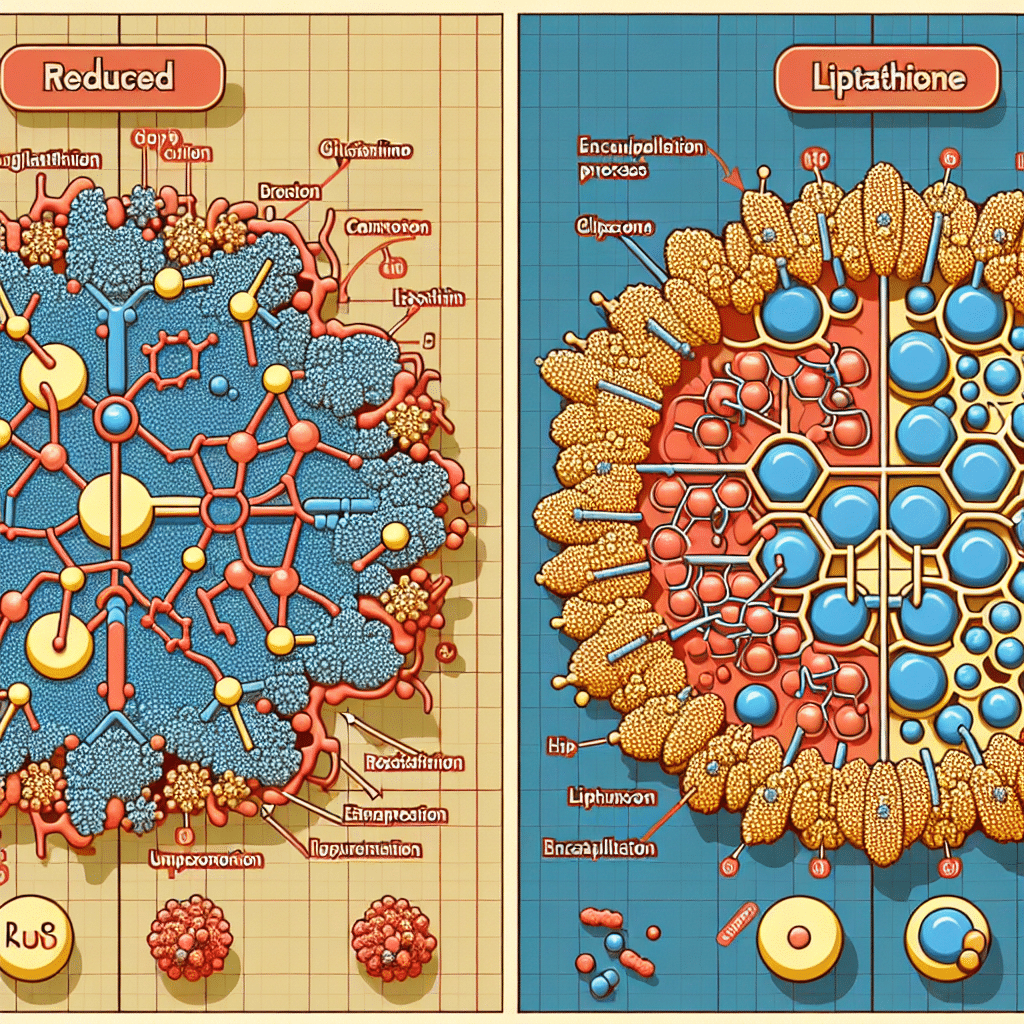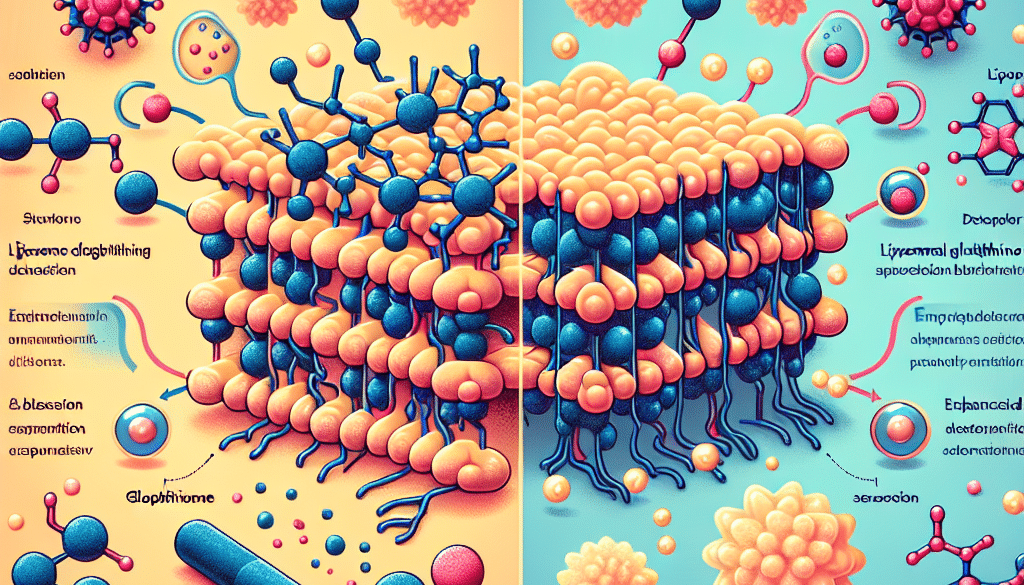Glutathione Reduced vs Liposomal: Differences
-
Table of Contents
- Glutathione Reduced vs Liposomal: Understanding the Differences
- What is Glutathione?
- Reduced Glutathione: The Basic Form
- Liposomal Glutathione: Enhanced Delivery System
- Comparing Absorption and Efficacy
- Choosing Between Reduced and Liposomal Glutathione
- Conclusion: Key Takeaways on Glutathione Forms
- Explore ETchem’s Protein Products
Glutathione Reduced vs Liposomal: Understanding the Differences

Glutathione is a powerful antioxidant that plays a crucial role in maintaining cellular health and preventing oxidative stress. It exists in two main forms: reduced glutathione and liposomal glutathione. While both forms aim to deliver the antioxidant benefits of glutathione, they differ significantly in their structure, absorption, and efficacy. This article will delve into the differences between reduced glutathione and liposomal glutathione, providing insights into which form might be best suited for your health needs.
What is Glutathione?
Before we explore the differences between reduced and liposomal glutathione, it’s essential to understand what glutathione is and why it’s important. Glutathione is a tripeptide composed of three amino acids: cysteine, glutamic acid, and glycine. It is naturally produced by the body and is found in every cell. Glutathione serves several vital functions, including:
- Neutralizing free radicals and preventing oxidative damage
- Supporting the immune system
- Detoxifying harmful substances
- Regenerating vitamins C and E
- Assisting in the metabolism of toxins and carcinogens
Despite its natural production, certain factors such as aging, poor nutrition, and environmental toxins can deplete glutathione levels, making supplementation beneficial.
Reduced Glutathione: The Basic Form
Reduced glutathione, also known as L-glutathione or GSH, is the active form of glutathione that is capable of donating electrons to stabilize free radicals. As an antioxidant, it is readily available to neutralize oxidative stress within the body. However, when taken orally as a supplement, reduced glutathione faces challenges:
- It is not well absorbed in the intestine due to the action of digestive enzymes.
- It has a short half-life, which means it is metabolized quickly by the body.
- It may not effectively increase cellular glutathione levels due to its rapid breakdown.
Despite these challenges, reduced glutathione supplements are still popular due to their direct provision of the active form of glutathione.
Liposomal Glutathione: Enhanced Delivery System
Liposomal glutathione is a form of glutathione that is encapsulated within liposomes—tiny spherical structures made from phospholipids, the same material that makes up cell membranes. This encapsulation offers several advantages:
- It protects glutathione from degradation by digestive enzymes.
- It facilitates the absorption of glutathione directly into the cells.
- It may lead to higher plasma and cellular levels of glutathione.
Liposomal delivery systems are designed to mimic the body’s own method of transporting substances across cell membranes, potentially making liposomal glutathione a more effective way to supplement this vital antioxidant.
Comparing Absorption and Efficacy
The primary difference between reduced and liposomal glutathione lies in their absorption and efficacy. Studies suggest that liposomal glutathione may offer superior bioavailability compared to non-liposomal forms. This means that a greater proportion of liposomal glutathione reaches the bloodstream and cells where it can exert its antioxidant effects.
For example, a clinical study published in the European Journal of Clinical Nutrition found that liposomal glutathione supplementation significantly increased body stores of glutathione compared to placebo. In contrast, traditional reduced glutathione supplements have shown mixed results in increasing glutathione levels effectively.
Choosing Between Reduced and Liposomal Glutathione
When deciding between reduced and liposomal glutathione, consider the following factors:
- Personal Health Goals: If you’re looking to significantly boost your glutathione levels, liposomal glutathione may be more effective.
- Absorption Concerns: If you have digestive issues or concerns about nutrient absorption, liposomal glutathione may offer better absorption.
- Budget: Liposomal glutathione is often more expensive due to the complex manufacturing process. If cost is a concern, reduced glutathione may be a more economical choice.
Ultimately, the choice between reduced and liposomal glutathione will depend on individual needs and preferences. Consulting with a healthcare professional can help you make an informed decision based on your specific health situation.
Conclusion: Key Takeaways on Glutathione Forms
In summary, both reduced and liposomal glutathione aim to provide the antioxidant benefits of glutathione, but they differ in their absorption and efficacy. Reduced glutathione is the basic form that may face challenges in absorption, while liposomal glutathione offers enhanced delivery and potentially greater bioavailability. When choosing a glutathione supplement, consider your health goals, absorption concerns, and budget to determine the best option for you.
Explore ETchem’s Protein Products
If you’re interested in high-quality protein supplements, consider exploring ETchem’s range of protein products. ETchem is a reputable manufacturer and supplier known for their premium collagens and protein supplements. Their offerings cater to various industries and are designed to meet diverse health and wellness needs.
About ETChem:
ETChem, a reputable Chinese Collagen factory manufacturer and supplier, is renowned for producing, stocking, exporting, and delivering the highest quality collagens. They include marine collagen, fish collagen, bovine collagen, chicken collagen, type I collagen, type II collagen and type III collagen etc. Their offerings, characterized by a neutral taste, instant solubility attributes, cater to a diverse range of industries. They serve nutraceutical, pharmaceutical, cosmeceutical, veterinary, as well as food and beverage finished product distributors, traders, and manufacturers across Europe, USA, Canada, Australia, Thailand, Japan, Korea, Brazil, and Chile, among others.
ETChem specialization includes exporting and delivering tailor-made collagen powder and finished collagen nutritional supplements. Their extensive product range covers sectors like Food and Beverage, Sports Nutrition, Weight Management, Dietary Supplements, Health and Wellness Products, ensuring comprehensive solutions to meet all your protein needs.
As a trusted company by leading global food and beverage brands and Fortune 500 companies, ETChem reinforces China’s reputation in the global arena. For more information or to sample their products, please contact them and email karen(at)et-chem.com today.




